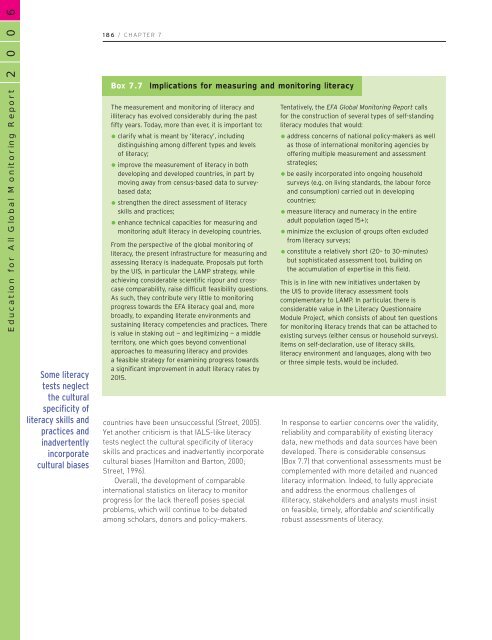literacy for life; EFA global monitoring report, 2006 - Institut de ...
literacy for life; EFA global monitoring report, 2006 - Institut de ...
literacy for life; EFA global monitoring report, 2006 - Institut de ...
Create successful ePaper yourself
Turn your PDF publications into a flip-book with our unique Google optimized e-Paper software.
0<br />
0<br />
6<br />
186 / CHAPTER 7<br />
2<br />
Education <strong>for</strong> All Global Monitoring Report<br />
Some <strong>literacy</strong><br />
tests neglect<br />
the cultural<br />
specificity of<br />
<strong>literacy</strong> skills and<br />
practices and<br />
inadvertently<br />
incorporate<br />
cultural biases<br />
Box 7.7<br />
Implications <strong>for</strong> measuring and <strong>monitoring</strong> <strong>literacy</strong><br />
The measurement and <strong>monitoring</strong> of <strong>literacy</strong> and<br />
il<strong>literacy</strong> has evolved consi<strong>de</strong>rably during the past<br />
fifty years. Today, more than ever, it is important to:<br />
clarify what is meant by ‘<strong>literacy</strong>’, including<br />
distinguishing among different types and levels<br />
of <strong>literacy</strong>;<br />
improve the measurement of <strong>literacy</strong> in both<br />
<strong>de</strong>veloping and <strong>de</strong>veloped countries, in part by<br />
moving away from census-based data to surveybased<br />
data;<br />
strengthen the direct assessment of <strong>literacy</strong><br />
skills and practices;<br />
enhance technical capacities <strong>for</strong> measuring and<br />
<strong>monitoring</strong> adult <strong>literacy</strong> in <strong>de</strong>veloping countries.<br />
From the perspective of the <strong>global</strong> <strong>monitoring</strong> of<br />
<strong>literacy</strong>, the present infrastructure <strong>for</strong> measuring and<br />
assessing <strong>literacy</strong> is ina<strong>de</strong>quate. Proposals put <strong>for</strong>th<br />
by the UIS, in particular the LAMP strategy, while<br />
achieving consi<strong>de</strong>rable scientific rigour and crosscase<br />
comparability, raise difficult feasibility questions.<br />
As such, they contribute very little to <strong>monitoring</strong><br />
progress towards the <strong>EFA</strong> <strong>literacy</strong> goal and, more<br />
broadly, to expanding literate environments and<br />
sustaining <strong>literacy</strong> competencies and practices. There<br />
is value in staking out — and legitimizing — a middle<br />
territory, one which goes beyond conventional<br />
approaches to measuring <strong>literacy</strong> and provi<strong>de</strong>s<br />
a feasible strategy <strong>for</strong> examining progress towards<br />
a significant improvement in adult <strong>literacy</strong> rates by<br />
2015.<br />
countries have been unsuccessful (Street, 2005).<br />
Yet another criticism is that IALS-like <strong>literacy</strong><br />
tests neglect the cultural specificity of <strong>literacy</strong><br />
skills and practices and inadvertently incorporate<br />
cultural biases (Hamilton and Barton, 2000;<br />
Street, 1996).<br />
Overall, the <strong>de</strong>velopment of comparable<br />
international statistics on <strong>literacy</strong> to monitor<br />
progress (or the lack thereof) poses special<br />
problems, which will continue to be <strong>de</strong>bated<br />
among scholars, donors and policy-makers.<br />
Tentatively, the <strong>EFA</strong> Global Monitoring Report calls<br />
<strong>for</strong> the construction of several types of self-standing<br />
<strong>literacy</strong> modules that would:<br />
address concerns of national policy-makers as well<br />
as those of international <strong>monitoring</strong> agencies by<br />
offering multiple measurement and assessment<br />
strategies;<br />
be easily incorporated into ongoing household<br />
surveys (e.g. on living standards, the labour <strong>for</strong>ce<br />
and consumption) carried out in <strong>de</strong>veloping<br />
countries;<br />
measure <strong>literacy</strong> and numeracy in the entire<br />
adult population (aged 15+);<br />
minimize the exclusion of groups often exclu<strong>de</strong>d<br />
from <strong>literacy</strong> surveys;<br />
constitute a relatively short (20– to 30–minutes)<br />
but sophisticated assessment tool, building on<br />
the accumulation of expertise in this field.<br />
This is in line with new initiatives un<strong>de</strong>rtaken by<br />
the UIS to provi<strong>de</strong> <strong>literacy</strong> assessment tools<br />
complementary to LAMP. In particular, there is<br />
consi<strong>de</strong>rable value in the Literacy Questionnaire<br />
Module Project, which consists of about ten questions<br />
<strong>for</strong> <strong>monitoring</strong> <strong>literacy</strong> trends that can be attached to<br />
existing surveys (either census or household surveys).<br />
Items on self-<strong>de</strong>claration, use of <strong>literacy</strong> skills,<br />
<strong>literacy</strong> environment and languages, along with two<br />
or three simple tests, would be inclu<strong>de</strong>d.<br />
In response to earlier concerns over the validity,<br />
reliability and comparability of existing <strong>literacy</strong><br />
data, new methods and data sources have been<br />
<strong>de</strong>veloped. There is consi<strong>de</strong>rable consensus<br />
(Box 7.7) that conventional assessments must be<br />
complemented with more <strong>de</strong>tailed and nuanced<br />
<strong>literacy</strong> in<strong>for</strong>mation. In<strong>de</strong>ed, to fully appreciate<br />
and address the enormous challenges of<br />
il<strong>literacy</strong>, stakehol<strong>de</strong>rs and analysts must insist<br />
on feasible, timely, af<strong>for</strong>dable and scientifically<br />
robust assessments of <strong>literacy</strong>.

















